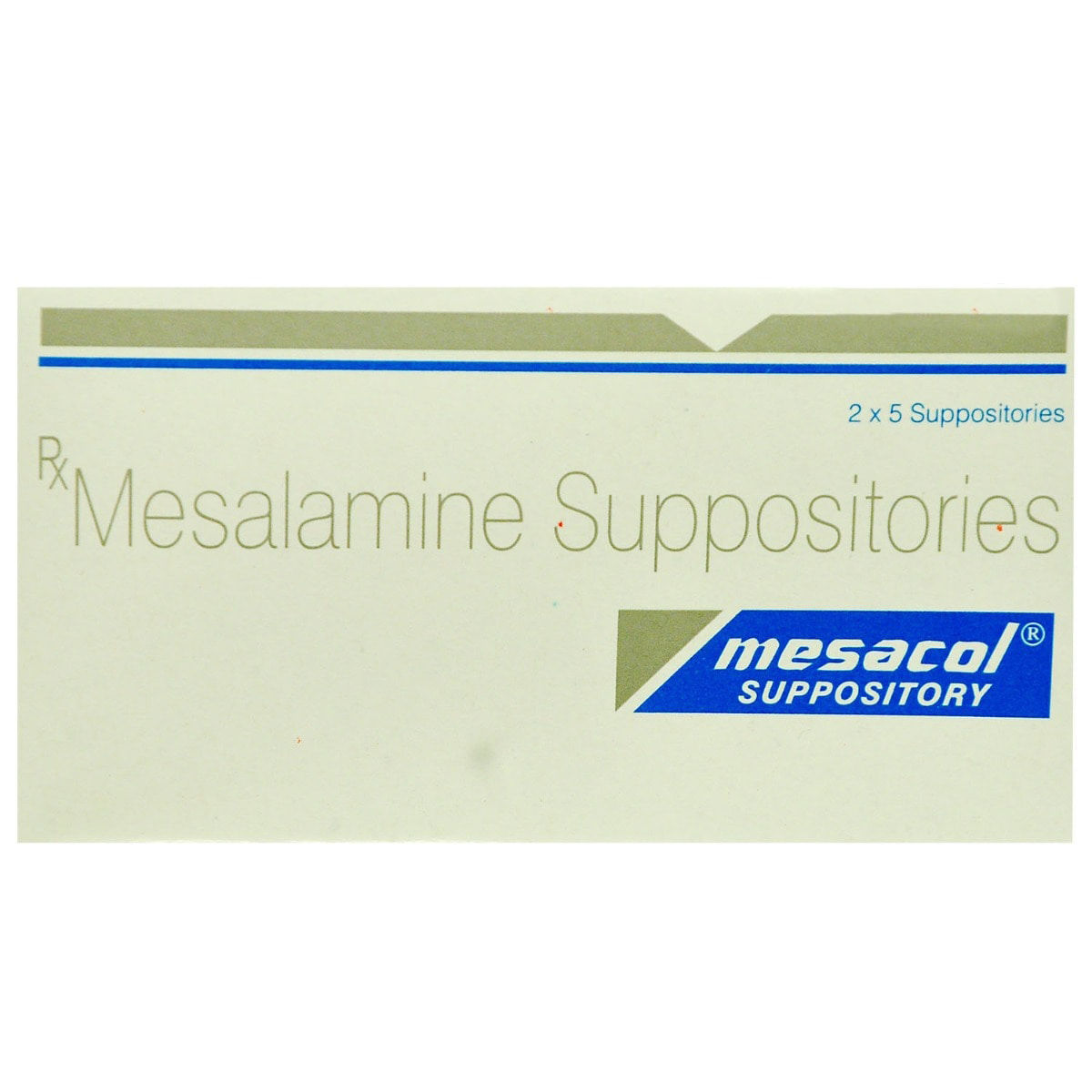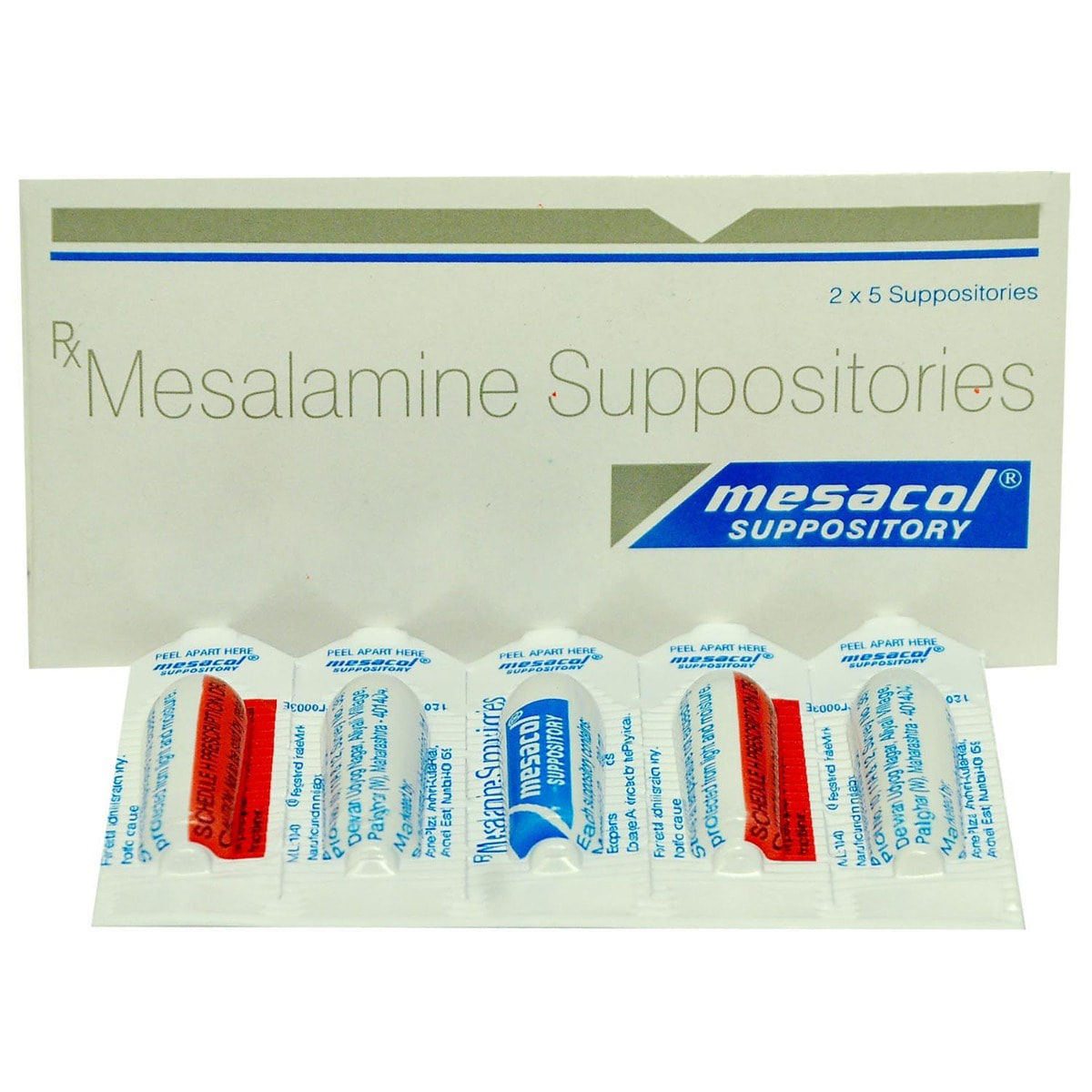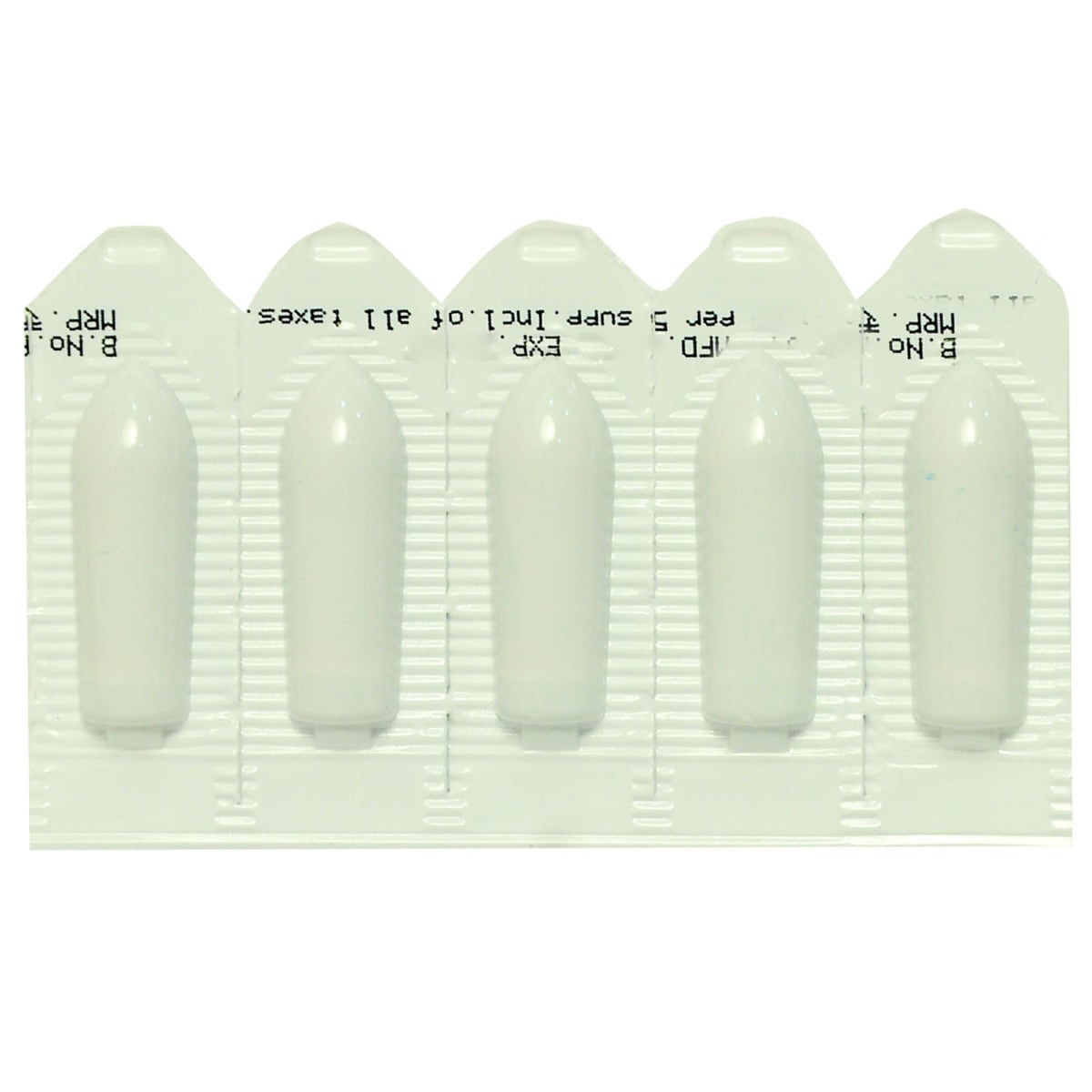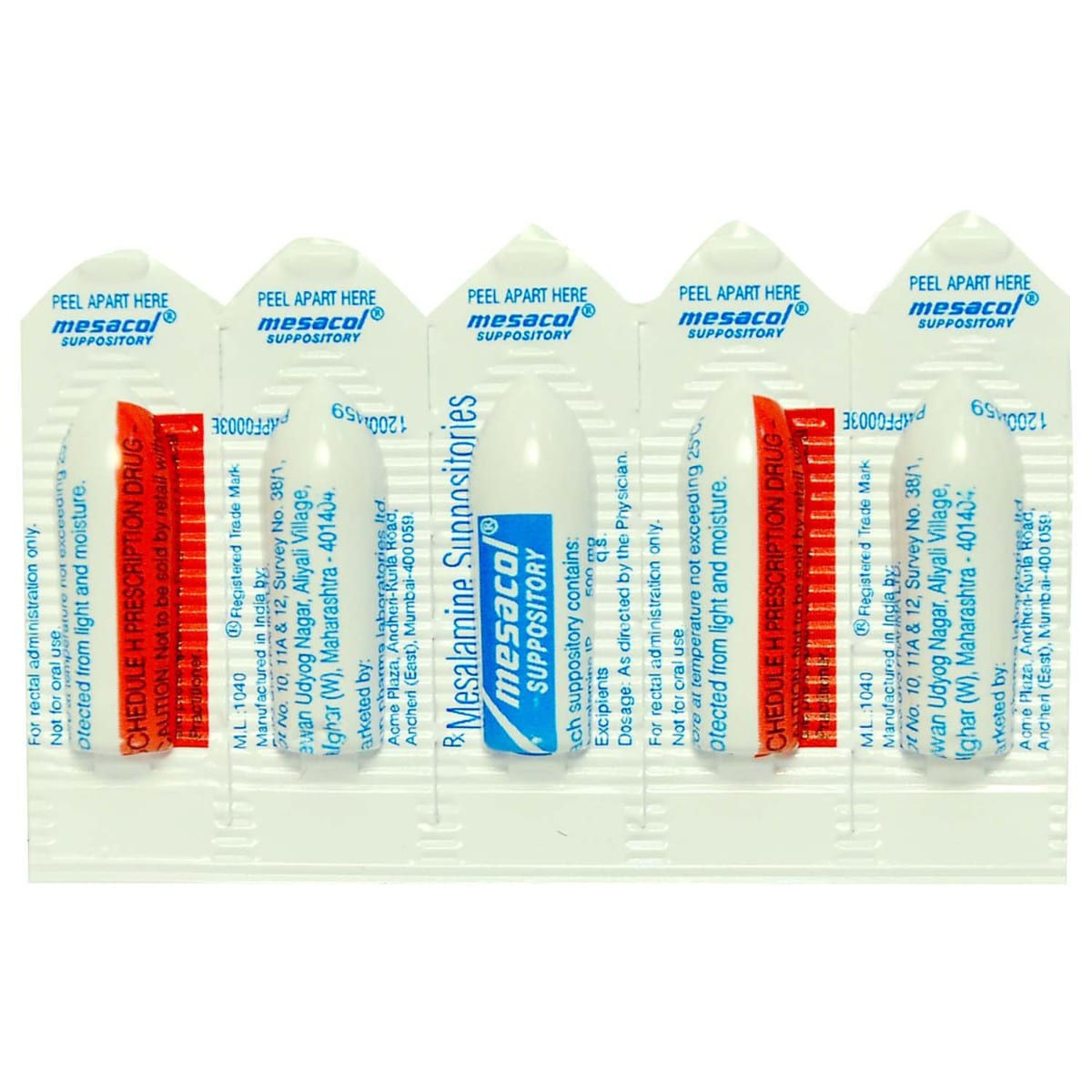Mesacol Suppository 5's
₹105.8*
MRP ₹117.5
10% off
₹99.87*
MRP ₹117.5
15% CB
₹17.63 cashback(15%)
Free Delivery
With Circle membership
(Inclusive of all Taxes)
This offer price is valid on orders above ₹800. Apply coupon PHARMA10/PHARMA18 (excluding restricted items)
Know Your Delivery Time
Provide Delivery Location





Selected Pack Size:5
5 ₹148.1
(₹29.62 per unit)
In Stock
7 ₹148.1
(₹21.16 per unit)
In Stock
Available Offers
 Prescription drug
Prescription drugWhats That

Secure Payment

India's Most Trusted Pharmacy

Genuine Products
Synonym :
Composition :
Manufacturer/Marketer :
Consume Type :
Return Policy :
Expires on or after :
About Mesacol Suppository
Mesacol Suppository is used to treat ulcerative colitis and ulcerative proctitis. Ulcerative colitis is a chronic inflammatory bowel disease that causes inflammation of the large intestine lining (colon). It produces ulcers on the colon's lining, which may cause bleeding and discharge of pus and mucus. Ulcerative proctitis is a condition in which ulcerative colitis solely affects the rear channel (rectum).
Mesacol Suppository contains Mesalamine, which works by preventing the synthesis of chemical messengers such as prostaglandins in the intestines that produce inflammation (swelling). This lowers ulceration, bleeding, and stomach pain while preventing future illness flare-ups.
Use Mesacol Suppository as directed by your physician. Sometimes, you may experience diarrhoea, stomach pain, headache or nausea. Most of these side effects of Mesacol Suppository do not require medical attention and gradually resolve over time. However, if the side effects persist or worsen, please consult your doctor.
Before taking the Mesacol Suppository, let your doctor know about all your medical conditions, sensitivities, and all medications you are using. Also, inform your doctor if you have severe kidney or liver failure or blood abnormalities like porphyria. Mesacol Suppository should not be used in pregnant and breastfeeding mothers unless necessary. So, inform your doctor if you are pregnant or breastfeeding. Your doctor will weigh the benefits and potential risks before prescribing Mesacol Suppository.
Uses of Mesacol Suppository
Directions for Use
Medicinal Benefits
Mesacol Suppository contains Mesalamine, an anti-inflammatory drug used to treat ulcerative colitis and ulcerative proctitis. It can also help treat other inflammatory bowel disease types, such as Crohn’s disease. It works by inhibiting the production of certain chemical substances, such as prostaglandins, that cause pain and swelling. This helps reduce inflammation (redness and swelling) in the intestines and provides relief from symptoms such as stomach pain or bleeding. Also, Mesacol Suppository may prevent further episodes of ulcerative colitis. It is especially useful when ulcerative colitis symptoms affect the rectum.
How Mesacol Suppository Works
Storage
Side Effects of Mesacol Suppository
Feeling sick (Nausea)
Being sick (Vomiting)
Diarrhoea
Stomach pain, indigestion
Headaches
Muscle aches
What if I have taken an overdose of Mesacol Suppository
Drug Warnings
Before taking the Mesacol Suppository, let your doctor know about all your medical conditions, sensitivities, and all medications you are using. Do not use Mesacol Suppository if you are pregnant, planning to become pregnant, or breastfeeding without first consulting the doctor. Mesacol Suppository is recommended not to be used in populations with severe renal or hepatic impairment, so inform your doctor if you have severe renal or hepatic impairment. Use Mesacol Suppository in dose and duration as advised by a doctor only. Do not swallow Mesacol Suppository. In case of accidental swallowing, drink plenty of water and consult a doctor immediately.
Drug-Drug Interactions
Drug-Drug Interactions
Login/Sign Up
Co-administration of Mesacol Suppository 5's with Cidofovir can increase the risk of kidney problems.
How to manage the interaction:
Taking Mesacol Suppository 5's with Cidofovir is generally avoided as it can possibly result in an interaction, it can be taken if a doctor has advised it. However, if you experience increased or decreased urination, sudden weight gain or loss, shortness of breath, consult a doctor. Do not discontinue any medications without consulting a doctor.
Co-administration of Tenofovir alafenamide with Mesacol Suppository 5's may increase the risk of kidney problems.
How to manage the interaction:
There is a possibility of interaction between Mesacol Suppository 5's with Tenofovir alafenamide, but they can be taken together if a doctor has prescribed them. Consult a doctor immediately if you experience increased or decreased urination, swelling, shortness of breath, bone pain, cramping in the muscles. Do not discontinue the medication without consulting a doctor.
Co-administration of omeprazole with Mesacol Suppository 5's can decrease the effects of Mesacol Suppository 5's.
How to manage the interaction:
There could be a possible interaction between Mesacol Suppository 5's and omeprazole, but they can be taken together if a doctor has prescribed them. Do not discontinue any medications without consulting a doctor.
Co-administration of Iodamide with Mesacol Suppository 5's may increase the risk of kidney problems.
How to manage the interaction:
Although, there is a possibility of interaction between Mesalamine with Iodamine they can be taken together if a doctor has prescribed them. Consult a doctor immediately if you experience any symptoms such as swelling in feet and ankles, itchy skin, shortness of breath, urinating either too much or too little. Do not discontinue any medication without consulting a doctor.
Co-administration of Metrizamide with Mesacol Suppository 5's may increase the risk of kidney problems.
How to manage the interaction:
Although, there is a possibility of interaction between Mesacol Suppository 5's with Metrizamide they can be taken together if a doctor has prescribed them. Consult a doctor immediately if you experience any symptoms such as swelling in feet and ankles, dry, itchy skin, urinating either too much or too little. Do not discontinue any medication without consulting a doctor.
Co-administration of Nizatidine with Mesacol Suppository 5's can decrease the level or effect of Mesalamine by increasing gastric pH.
How to manage the interaction:
Although there may be a possible interaction between Mesacol Suppository 5's with Nizatidine, they can be taken together if a doctor has prescribed them. Do not discontinue any medications without consulting a doctor.
Co-administration of Ranitidine with Mesacol Suppository 5's can decrease the levels of Mesacol Suppository 5's, which may be less effective in treating a condition.
How to manage the interaction:
There may be a possible interaction between Mesacol Suppository 5's with Ranitidine, but they can be taken together if a doctor has prescribed them. Do not discontinue any medications without consulting a doctor.
Co-administration of Deferasirox with Mesacol Suppository 5's may increase the risk of kidney problems.
How to manage the interaction:
Although there is a possibility of interaction between Mesacol Suppository 5's and Deferasirox but they can be taken together if a doctor has prescribed them. Consult a doctor immediately if you experience any symptoms such as increased or decreased urination, abrupt weight gain or loss, weakness, or dizziness. Do not discontinue the medication without consulting a doctor.
Co-administration of Iomeprol with Mesacol Suppository 5's may increase the risk of kidney problems.
How to manage the interaction:
Although, there is a possibility of interaction between Mesacol Suppository 5's and Iomeprol they can be taken together if your doctor has prescribed them. Consult a doctor immediately if you experience any symptoms such as swelling in feet and ankles, urinating either too much or too little. Do not discontinue any medication without consulting a doctor.
Drug-Food Interactions
Drug-Food Interactions
Login/Sign Up
Diet & Lifestyle Advise
Maintain a low-fat diet and eat foods rich in vitamin C, such as bell peppers, spinach, parsley and berries, which help heal faster.
Opt for food and drinks high in Omega 3 fatty acids to relieve pain, swelling, and inflammation. Omega 3 rich acid-enriched foods include flaxseeds, walnut, soybean oil, salmon, and tuna if you prefer non-veg.
Eat more fibre-rich foods such as fruits and vegetables.
Eat smaller meals all day.
Drink small amounts of water throughout the day.
If you are intolerant to lactose, lower your intake of milk.
Avoid foods high in sugar, fat, and processed foods, as these, may cause inflammation.
Try to avoid alcohol as it can affect your stomach and intestine and also limits the absorption of the important nutrients required by your body.
Habit Forming
Therapeutic Class
Alcohol
Caution
The interaction of alcohol with Mesacol Suppository is unknown. However, avoid consuming alcohol while on treatment with this medicine.
Pregnancy
Consult your doctor
Mesacol Suppository should not be used in pregnancy unless necessary. So, inform your doctor if you are pregnant or suspect pregnancy. Your doctor will weigh the benefits and potential risks before prescribing Mesacol Suppository.
Breast Feeding
Consult your doctor
Mesacol Suppository should not be used while breastfeeding unless necessary. So, inform your doctor if you are a nursing mother. Your doctor will weigh the benefits and potential risks before prescribing Mesacol Suppository.
Driving
Safe
Mesacol Suppository usually does not affect your ability to drive or operate machinery.
Liver
Caution
Inform your doctor before receiving Mesacol Suppository if you have a history of liver diseases/conditions. It should be used cautiously in patients with mild to moderately impaired liver function. It is recommended not to be used in populations with severe liver impairment.
Kidney
Caution
Inform your doctor before receiving Mesacol Suppository if you have a history of kidney diseases/conditions. It should be used cautiously in patients with mild to moderately impaired kidney function. It is recommended not to be used in populations with severe kidney impairment.
Children
Caution
Mesacol Suppository is intended for adults. Not recommended for children.
FAQs
Country of origin
Manufacturer/Marketer address
Customers Also Bought
Disclaimer
Author Details
We provide you with authentic, trustworthy and relevant information



















